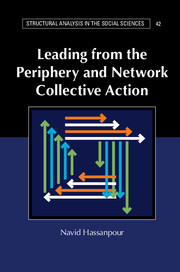Leading from the Periphery and Network Collective Action
Political revolutions, economic meltdowns, mass ideological conversions and collective innovation adoptions occur often, but when they do happen, they tend to be the least expected. Based on the paradigm of 'leading from the periphery', this groundbreaking analysis offers an explanation for such spontaneity and apparent lack of leadership in contentious collective action. Contrary to existing theories, the author argues that network effects in collective action originating from marginal leaders can benefit from a total lack of communication. Such network effects persist in isolated islands of contention instead of overarching action cascades, and are shown to escalate in globally dispersed, but locally concentrated networks of contention. This is a trait that can empower marginal leaders and set forth social dynamics distinct from those originating in the limelight. Leading from the Periphery and Network Collective Action provides evidence from two Middle Eastern uprisings, as well as behavioral experiments of collective risk-taking in social networks.
- Online appendices provide access to extensive scans of emails referenced in the text, hundreds of survey interviews and further visualisations
- Utilises new modes of data, such as internet-induced information and online behavioural experiments, as well as novel methods such as quasi-experiments of media disruption on a national scale to test the theories
- Combines analytical and empirical results intended for an academic reader, along with textual representation targeted for a wider general audience
Reviews & endorsements
‘This important book adds to theories of collective action by describing conditions under which protests and rebellions actually spread following the disruption of centralized leadership and communication. The contagious spread of peripheral networks results in distributed collective action that becomes ever more difficult to contain. This subtle argument is illustrated with data from contemporary uprisings in Egypt and Syria, along with fascinating experiments on risk-taking in disrupted information environments.' Lance Bennett, Ruddick C. Lawrence Professor of Communication, University of Washington, Seattle
‘… the book is an important, novel, and valuable contribution to the study of social movements, and constitutes a blueprint for how one can conduct research on relevant historical processes interweaving useful insights from extensive data collection, formal modeling, and experiments.’ Delia Baldassarri, American Journal of Sociology
Product details
June 2017Adobe eBook Reader
9781108166805
0 pages
0kg
55 b/w illus. 1 map 23 tables
This ISBN is for an eBook version which is distributed on our behalf by a third party.
Table of Contents
- 1. Mobilization from the margins
- 2. Decentralization of revolutionary unrest: dispersion hypothesis
- 3. Vanguards at the periphery, a network formulation
- 4. Civil war and contagion in small worlds
- 5. Peripheral influence, experimentations in collective risk taking
- 6. Decentralization and power, novel modes of social organization
- Appendix.






